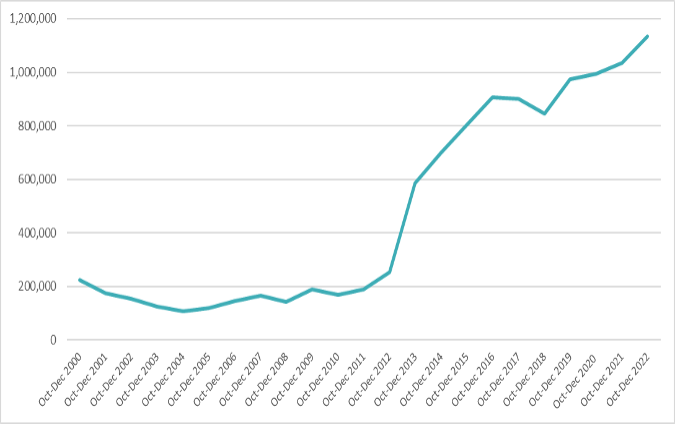BME women far more likely to be on zero-hours contracts
The TUC warns “structural racism in the jobs market is holding BME women back”, trapping them in low-paid jobs with few rights at work. The TUC calls for action to tackle this racial disparity by measures including banning zero-hours contracts and introducing ethnicity pay gap reporting.
Data on zero- hours contracts
There are currently 1.18 million workers employed on zero-hours contracts. These contracts are characterised by low pay, variable hours and fewer rights and protections for workers.
In employment on zero-hours contracts

Source: ONS
TUC analysis further shows that BME workers are significantly overrepresented on zero-hours contracts compared to white workers (5.7 per cent compared to 3.2 per cent).
BME women are the most disproportionately affected group and are nearly three times as likely to be on zero-hours contracts as white men (6.8 per cent compared to 2.5 per cent).
White women are also significantly more likely than white men to be on zero-hours contracts (4.0 per cent compared to 2.5 per cent).
Percentage of men and women by ethnicity on zero-hours contracts
|
|
White |
BME |
|
Men |
2.5% |
4.8% |
|
Women |
4.0% |
6.8% |
|
Total |
3.2% |
5.7% |
Source: (TUC analysis of Labour Force Survey, Q2, 2023)
Zero- hours contracts are not new. But their use has increased since 2010 under the Coalition and then Conservative Governments. In 2011 around 190,000 were on zero-hours contracts and now well over a million are.
This can’t simply be put down to growing awareness of the term “zero-hours contracts”. If it was then reports of other forms of temporary casual work would have fallen rapidly too. But this hasn’t happened.
What is the problem with zero- hours contracts?
Zero-hours contracts are the most egregious example of one-sided flexibility at work, with the employer having absolute power over whether and when to offer shifts. This makes it harder for workers to challenge unacceptable behaviour by bosses because of concerns about whether they will be penalised by not being allocated hours in future.
Flexibility exists for the employer, but not the worker.
The uncertainty over working hours is a particular issue for those who have caring responsibilities, who are overwhelmingly women.
Not knowing what your next pay cheque will be makes it difficult to pay bills. Such insecure work makes it difficult to access financial services such as mortgages and loans.
The TUC is calling for government action to end the scourge of insecure work.
The union body says Labour’s New Deal for Working People would be a gamechanger for workers’ rights –including those on zero hours contracts.
Labour’s new deal would:
- Strengthen collective bargaining by introducing fair pay agreements to boost pay and conditions – starting in social care.
- Introduce ethnicity pay gap reporting and disability pay gap reporting.
- Ban zero hours contracts.
- Give all workers day one rights on the job.
- Ensure all workers get reasonable notice of any change in shifts or working time with compensation that is proportionate to the notice given for any shifts cancelled or curtailed.
- Stronger enforcement by making sure labour market enforcement bodies have the powers they need to undertake targeted and proactive enforcement work and bring civil proceedings.
Stay Updated
Want to hear about our latest news and blogs?
Sign up now to get it straight to your inbox
